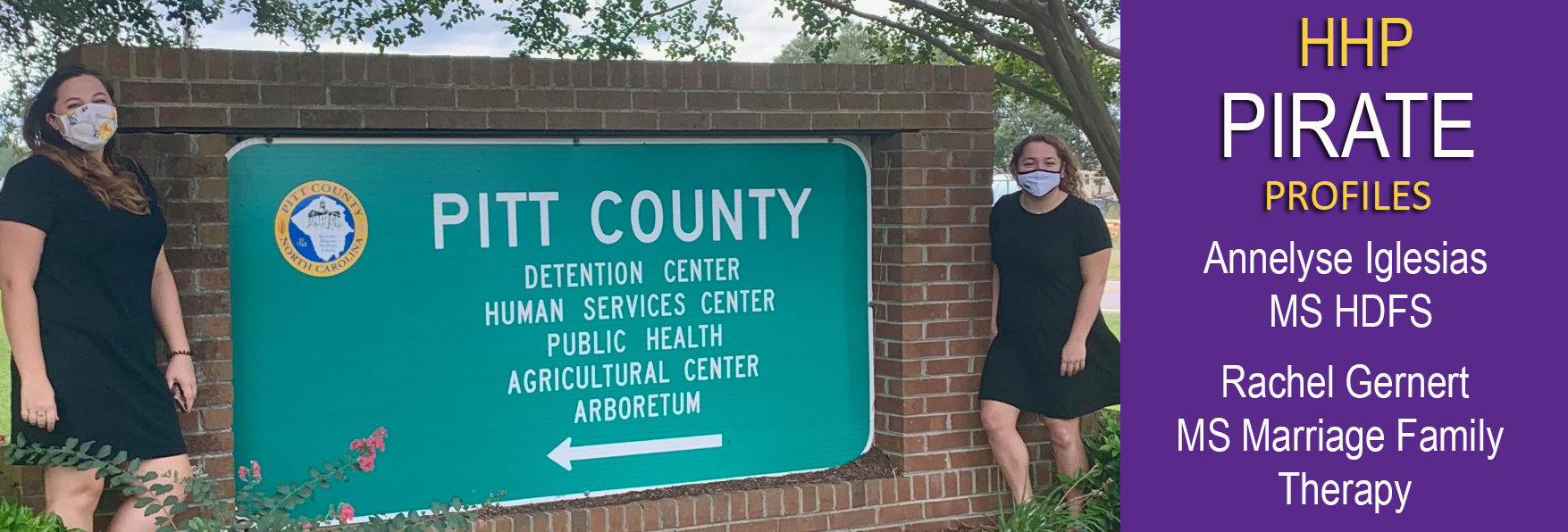Annelyse & Rachel Research Profile
Names:
Annelyse Iglesias & Rachel Gernert
Major:
Annelyse: MS Human Development and Family Science
Rachel: Masters in Marriage and Family Therapy
Hobbies / Interests:
Annelyse: Crafting, Disney, Traveling
Rachel: I like being outside doing anything, cooking, painting, and listening to music or podcasts.
What brought you to ECU?
Annelyse: I wanted to stay close to home in North Carolina, and ECU had a great MS program.
Rachel: I wanted to go somewhere new for grad school. Then I discovered how awesome the ECU MFT program was, plus I had never even stepped foot in North Carolina.
Describe your experience working and researching within the Pitt County Jail?
Annelyse: Over that past year, Rachel and I have assisted Dr. Harcourt-Medina to facilitate life skills classes at the Pitt County Detention Center. Each week we go into the facility and work with small groups of men and women in the S.H.A.R.P. and W.E.A.R. programs.
Rachel: Annelyse and I assist Dr. Harcourt-Medina in teaching a relational skills class that is a part of a program called S.H.A.R.P. (Sheriff’s Heroin Addiction Recovery Program). SHARP is the program name for the men, but there is also a women’s program called W.E.A.R (Women’s Empowerment and Recovery). We are just one group of volunteers that go in to teach, they also have other community volunteers that assist in other areas of need. Our current research is evaluating the SHARP program to see if this multi-facet intervention program aids in successful reentry for participants.
Working in the jail has been a new experience for me, but I really enjoy it. I really like having a partner to be on this journey with as well because we both bring different experiences and knowledge to the table.
What led you to work in this setting?
Annelyse: I’ve always had an interest in criminal justice. When I met Dr. KT last year and heard about her work, I was eager to get involved. This project connects my passion for criminal justice with my interest in human development.
Rachel: My bachelor’s degree is in Psychology and Criminology, so I have always had an interest in this population. I was not sure how or if I was going to be able to pursue that with my current major, but then I saw Dr. Harcourt-Medina’s research while applying for assistantships, and I was very excited.
What is your favorite part about your research experience?
Annelyse: My favorite part about this experience is when participants share with us how the knowledge and skills we talk about each week are being applied in their lives and helping them strengthen their relationships with their loved ones.
Rachel: I really like how hands-on my assistantship is. Not only do I gain research experience in evaluating a developing program, but I actually get to go teach in the jail as well.
What is your favorite aspect of the HDFS program?
Annelyse: The people! I feel so lucky to be surrounded by the most supportive peers and faculty.
Rachel: The faculty. It has been my experience that the faculty is always there to help you out when you need it, and they are all so welcoming. Both qualities have been very helpful throughout my time here so far.
Do you have any advice to incoming HDFS students?
Annelyse: Keep your options open, while you may be in this program with specific career plans, investigate all the HDFS possibilities, there are more than you think.
Rachel: I would just say to go after any opportunity that you want. You may discover a new passion/career path, or you might find out you do not like something as much as you thought. Either way, I think that it will be worthwhile to try.
